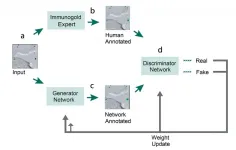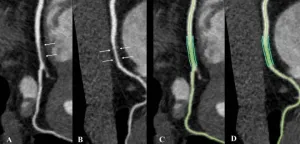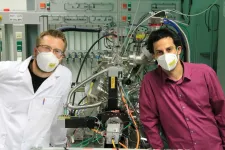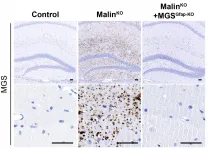(Press-News.org) A recent study suggests that preserving physical and mental health helps older adults experiencing cognitive impairment stave off declines in cognitive engagement.
"We found that declines in physical and mental health were associated with more pronounced cognitive disengagement," says Shevaun Neupert, corresponding author of the study and a professor of psychology at North Carolina State University. "The impact of declines in physical health was particularly pronounced for study participants who had more advanced cognitive impairment to begin with."
There's a lot of research showing that cognitive engagement can help older adults maintain cognitive health. However, the vast majority of that work has been done on healthy adults.
"There's very little work on cognitive engagement in people who are already cognitively impaired, such as people who have been diagnosed with dementia," Neupert says. "Are they still capable of sustained cognitive engagement? What factors contribute to that engagement?"
To begin addressing those questions, the researchers enlisted 28 study participants. All of the participants were over 60 and had documented cognitive impairment. Participants came to a testing site two times, six months apart. On each visit, researchers collected data on the physical and mental health of the study participants and performed a battery of tests designed to assess cognitive ability. Participants were also connected to a device that tracked blood pressure continuously and then asked to engage in a series of increasingly difficult cognitive tasks. This allowed researchers to track how cognitive engagement changed as the tasks become progressively harder.
Cognitive engagement means taking part in activities that are mentally challenging. Monitoring blood pressure allows the researchers to track how hard study participants are working to accomplish cognitive tasks. Specifically, blood pressure rises as more blood is pumped to the brain when participants work harder at these tasks.
Broadly speaking, the researchers found that if a participant's cognitive ability, physical health or mental health declined over the course of the six month study period, that participant became less cognitively engaged as the tasks became harder.
"Normally, you'd expect more engagement as the tasks became harder, but we found that some people essentially stopped trying," says Claire Growney, co-author of the study and a postdoctoral researcher at Washington University in St. Louis.
"The findings highlight the fact that well-being is holistic; physical health, mental health and cognitive function can influence each other," says Xianghe Zhu, co-author of the paper and a recent Ph.D. graduate of NC State.
"In practical terms, it suggests that it may be particularly important for people to focus on mental and physical well-being during the early stages of cognitive decline," Growney says. "Or, at the very least, don't become so focused on addressing cognitive challenges that you ignore physical health, or create anxiety or emotional distress for yourself that leads to mental health problems."
"Future research will be needed to determine how beneficial it might be for people to take part in cognitively engaging activities once they've started experiencing cognitive decline," Neupert says. "But we already know that there is an element of 'use it or lose it' to cognitive function in healthy adults. And while it's understandable for people to want to avoid tasks that are difficult or challenging, it's really important to continue challenging ourselves to take part in difficult cognitive activities."
INFORMATION:
The paper, "BFF: Bayesian, Fiducial, and Frequentist Analysis of Cognitive Engagement among Cognitively Impaired Older Adults," is published open access in the journal entropy. The paper was co-authored by Julia Sorensen, a Ph.D. student at NC State; Emily Smith, a postdoctoral researcher at NC State; and Jan Hannig, a professor of statistics and operations research at the University of North Carolina at Chapel Hill.
The work was done with support from the National Institute on Aging, under grant R01AG005552-28S1; and from the National Science Foundation, under grants IIS-1633074 and DMS-1916115.
With roughly 80% of jobs being sedentary, often requiring several hours of sitting stooped in front of a computer screen, neck pain is a growing occupational hazard. Smartphones and other devices have also caused people to bend their necks for prolonged periods. But is bad posture solely to blame?
In a recent study, researchers at Texas A&M University have found that while poor neck and head postures are indeed the primary determinants of neck pain, body mass index, age and the time of the day also influence the neck's ability to perform sustained or repeated movements.
"Neck pain is one of the leading and fastest-growing ...
UNIVERSITY PARK, Pa. -- Have you recently turned to your mobile device or computer to find out if your cough, sniffle or fever could be caused by COVID-19?
The online symptom checker you used may have advised you to stay home and call your medical provider if symptoms worsen, or perhaps told you that you may be eligible for COVID-19 testing. But why did it make the recommendation it did? And how should you know if you can trust it?
Those are questions that researchers at the Penn State College of Information Sciences and Technology recently explored through a project in which they augmented online symptom checkers by offering explanations of how the system generated its probable diagnoses and suggestions ...
From sample preparation to image acquisition, electron microscopy (EM) requires precise and time-consuming steps to produce the clarity and detail needed to visualize small cell structures with high resolution. Moreover, once EM images are created, extracting the biological information out of them through analysis can be an even more laborious and time intensive task. Especially because current EM analysis software often requires the skilled eye of a scientist to manually review hundreds of images.
With a bit of ingenuity and the application of cutting-edge neural networks, an interdisciplinary team of scientists at the Max Planck Florida Institute for Neuroscience (MPFI) have created a new ...
OAK BROOK, Ill. - People living with human immunodeficiency virus (HIV) and without known cardiovascular disease have two to three times the noncalcified coronary plaque burden of non-HIV healthy volunteers, according to a study from Canada published in Radiology. Researchers said the results underscore the importance of a heart-healthy lifestyle in people living with HIV.
HIV/AIDS emerged as a major public health crisis in the 1980s. Disease-related mortality peaked in the mid-1990s and has been dropping since, thanks in large part to antiretroviral therapy, which does not cure the disease but helps control it.
Today, people ...
Researchers at Beam Therapeutics have developed a redesigned base editor that shows considerable promise in directly repairing the single-base mutation that causes sickle-cell disease (SCD). Many strategies are being pursued to harness genome editing approaches including CRISPR to treat patients with SCD and related hemoglobinopathies. The most advanced method in the clinic involves targeting an upstream regulatory pathway to switch on expression of the fetal hemoglobin gene but does not target the SCD mutation directly.
Writing in the April issue of The CRISPR Journal, a team at Beam Therapeutics, led by Ian Slaymaker and Giuseppe Ciaramella, describe the successful ...
In a study conducted at the University of Helsinki, researchers found a cause for severe epilepsy resulting in death in Parson Russell Terrier puppies at a few months of age. A change in the PITRM1 gene can lead to a dysfunction of mitochondria, the cellular energy pumps. Concurrently, amyloid-β accumulation and widespread neurodegeneration associated with Alzheimer's disease were identified in the puppies' brains. Changes to the PITRM1 gene in humans also cause a severe but slowly progressing brain disease.
Some Parson Russell Terrier puppies were seen to suddenly develop epileptic seizures at 6 to 12 weeks of age. The disease progressed very rapidly, in a matter of hours in the worst cases, to a situation where the seizures were continuous and unresponsive to medication.
"All ...
Exposure to certain endocrine-disrupting chemicals could elevate the risk of breast cancer, according to a new comprehensive systematic review of epidemiological research. However, for many chemicals, evidence is inconsistent or still limited. The review was carried out by researchers at the universities of Hong Kong and Eastern Finland and published in Critical Reviews in Food Science and Nutrition.
Endocrine-disrupting chemicals (EDCs) can interfere with the body's hormonal system, also called the endocrine system, and are widely present in the environment. They originate from a variety of ...
If the CO2 content of the atmosphere is not to increase any further, carbon dioxide must be converted into something else. However, as CO2 is a very stable molecule, this can only be done with the help of special catalysts. The main problem with such catalysts has so far been their lack of stability: after a certain time, many materials lose their catalytic properties.
At TU Wien, research is being conducted on a special class of minerals - the perovskites, which have so far been used for solar cells, as anode materials or electronic components rather than for their catalytic properties. Now scientists at TU Wien have succeeded in producing a special perovskite that is excellently suited as ...
As we accumulate more and more gene-sequencing information, cell-type databases are growing in both size and complexity. There is a need to understand where different types of cells are located in the body, and to map their gene expression patterns into specific locations in tissues and organs. For example, a gene can be actively expressed in one cell while suppressed in another.
One way of mapping genes into tissues is a technique called in situ hybridization. Simply put, a target gene is tagged ("hybridized") with a fluorescent marker within the sections of the tissue it is located in (the "in situ" part). The sections are then visualized under a specialized microscope to see where the gene "lights up". Consecutive photographs of each section are then put together to generate a ...
Lafora disease is an inherited neurodegenerative condition that initially develops with seizures in adolescence and evolves with progressive degeneration of the nervous system to death, about ten years after its onset. It is characterised by the accumulation of abnormal glycogen aggregates called Lafora bodies in the brain. There is currently no treatment for this condition, although some therapies are being tested in clinical trials.
Led by Dr. Joan Guinovart, emeritus professor of the University of Barcelona (UB) and also group leader of CIBERDEM, the Metabolic Engineering lab at IRB Barcelona has discovered that Lafora bodies that accumulate in glial cells, which are essential for the proper ...



